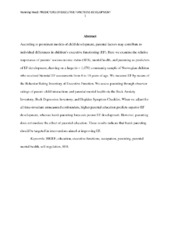Parental predictors of children’s executivefunctioning from ages 6 to 10
Peer reviewed, Journal article
Accepted version

Åpne
Permanent lenke
https://hdl.handle.net/1956/21095Utgivelsesdato
2019Metadata
Vis full innførselSamlinger
Originalversjon
https://doi.org/10.1111/bjdp.12282Sammendrag
According to prominent models of child development, parental factors may contribute to individual differences in children’s executive functioning (EF). Here, we examine the relative importance of parents’ socio-economic status, mental health, and parenting as predictors of EF development, drawing on a large (n = 1,070) community sample of Norwegian children who received biennial EF assessments from 6 to 10 years of age. We measure EF by means of the Behavior Rating Inventory of Executive Function. We assess parenting through observer ratings of parent–child interactions and parental mental health via the Beck Anxiety Inventory, Beck Depression Inventory, and Hopkins Symptom Checklist. When we adjust for all time-invariant unmeasured confounders, higher parental education predicts superior EF development, whereas harsh parenting forecasts poorer EF development. However, parenting does not mediate the effect of parental education. These results indicate that harsh parenting should be targeted in interventions aimed at improving EF.